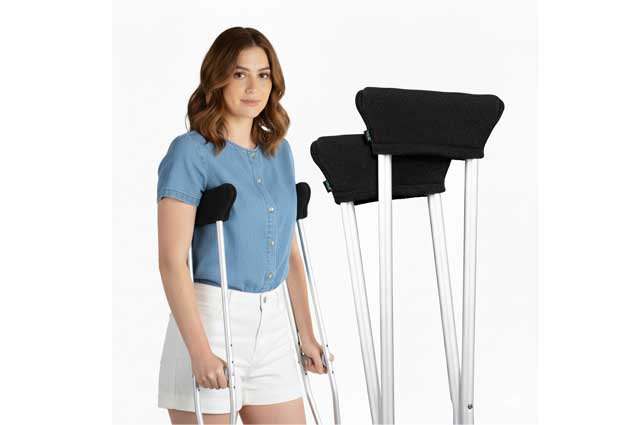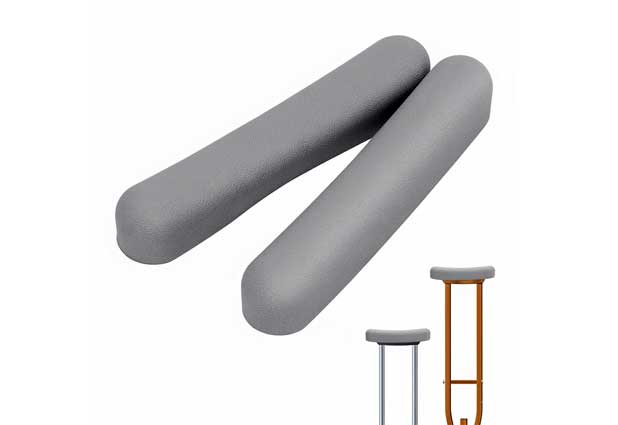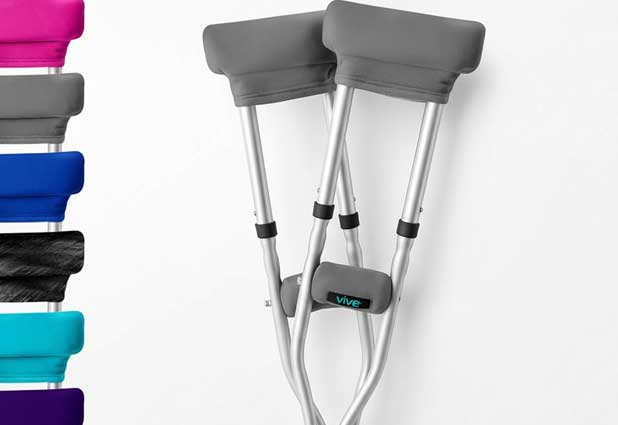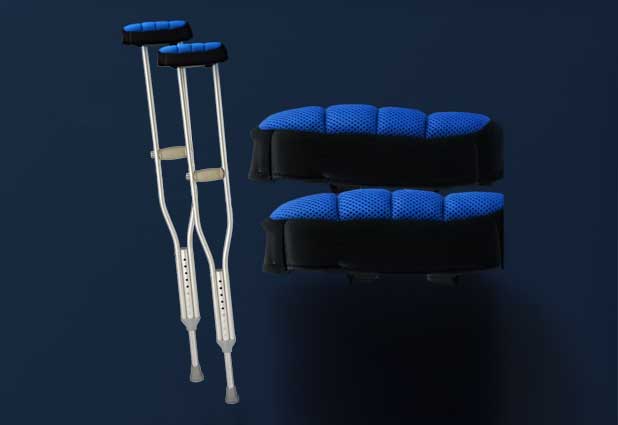Key Takeaways
Best Overall
ComfortMax Gel: gel padding stays cool while the washable cover dries in 4 hours and keeps hot spots away on 30-minute walks.
Best Sweat Control
CoolDry Mesh: breathable mesh and open-cell foam wick moisture faster than gel, ideal for warm weather.
Best Budget
Drive Medical Foam Pads: slip-on vinyl cushions at $12 per pair for short-term recovery with instant installation.
Softest Feel
Vive Memory Foam: plush fabric molds to your armpit and grips all fabrics but dries slow.
How I Tested
I tracked six cushion sets over four weeks while hiking, grocery runs, and stair climbs, recording comfort, slip, heat, cleaning, and odor.
- Walking drills: 30-minute loops on neighborhood paths, up and down office stairs, and through crowds.
- Clothing matrix: Wear-tested with cotton tees, fleece, and nylon so the cushions had to stay put across textures.
- Installation: Timed how long Velcro straps or slip-on sleeves took to secure and how often they needed adjustment.
- Cleaning cycles: Wipe-downs after each use plus machine washes for removable covers; drying times recorded.
- Weight/Odor: Kitchen scale readings to 0.1 oz precision and smell checks after a week of daily use.
Real-world testing beats spec sheets every time, and I used these notes to decide which cushions truly earned a spot in the picks below.
Top Crutch Cushion Picks
This article contains affiliate links to Amazon. If you buy through these links, we may earn a small commission at no extra cost to you.

ComfortMax Gel Underarm Cushions
$28 per pair · Weight: 2.4 oz · Attachment: Velcro straps
Gel padding eliminates hot spots on long walks and the cover dries in four hours after washing.
- Outstanding pressure relief
- Stays cool even in heat
- Washable nylon cover
- Velcro straps stay tight
- Heavier at 2.4 oz
- More expensive than foam
- Can feel cold in winter

CoolDry Mesh Cushions
$22 per pair · Weight: 1.6 oz · Attachment: Elastic straps
Mesh cover wicks sweat fast and the breathable foam dries in three hours, perfect for warm climates.
- Excellent airflow
- Lightweight for active days
- Fast drying cover
- Mid price, good value
- Elastic needs tightening
- Slight odor after a week

Drive Medical Foam Pads
$12 per pair · Weight: 0.9 oz · Attachment: Slip-on
Instant slip-on installation makes them handy for short-term users or guests.
- Cheapest option
- Lightweight and easy to swap
- No straps required
- Slides on smooth fabrics
- Traps heat and odor
- Compresses after three weeks

Vive Memory Foam Pads
$24 per pair · Weight: 1.8 oz · Attachment: Velcro straps
Plush foam molds to your shape but takes five hours to dry after a wash.
- Softest feel
- Plush cover grips clothes
- Washable, gentle cover
- Slow rebound after sitting
- Warms up after 15 minutes
- Drying time is long
Comparison Table
| Model | Type | Weight Added | Attachment | Wash | Price |
|---|---|---|---|---|---|
| ComfortMax Gel | Gel | 2.4 oz | Velcro straps | Machine wash cover | $28 |
| CoolDry Mesh | Open-cell foam | 1.6 oz | Elastic straps | Machine wash cover | $22 |
| Drive Medical Foam | Closed-cell foam | 0.9 oz | Slip-on | Wipe only | $12 |
| Vive Memory Foam | Memory foam | 1.8 oz | Velcro straps | Machine wash cover | $24 |
Fit And Sizing Guide
Most cushions fit adult underarm crutches from Drive Medical, Medline, and Carex. Standard pads measure about 5–6 inches wide and 1.5 inches thick.
Youth crutches need smaller pads; forearm crutch cushions use different attachment points and won't work here.
Strap vs Slip-On
Strap-on options (Velcro or elastic) offer better hold for long walks but take 2–3 minutes to install; slip-on cushions slide over existing pads in seconds but can drift on smooth fabrics.
Quick Measuring Steps
- Measure pad width (standard 5–6 inches) and thickness (1–1.5 inches).
- Check for cutouts or unusual shapes.
- Confirm your crutch model is adult, not youth.
Materials Explained
| Material | Pros | Cons |
|---|---|---|
| Gel | Best pressure relief, stays cool, resists odor. | Heaviest, most expensive, can feel cold. |
| Memory Foam | Molds to shape, cushy feel, washable covers. | Slow rebound, warms up, longest dry time. |
| Open-cell Foam | Breathable, dries fast, wicks sweat. | Less pressure relief, needs frequent washing. |
| Closed-cell Foam | Lightweight, cheap, easy to swap out. | Traps heat, compresses quickly, not washable. |
Pricing Snapshot
- Budget foam ($10–$15): Slip-on vinyl cushions lasting 4–6 weeks.
- Mid-range ($18–$25): Mesh or memory foam with washable covers, lasts 2–4 months.
- Premium gel ($26–$35): Long-lasting comfort for daily use over eight weeks.
For a two-month recovery, two sets of $12 foam costs $24. One set of $28 gel lasts the same span with better comfort.
Buyer Fast Checks
Checklist
- Weight check: If it feels heavy, it will drag after 20 minutes.
- Squeeze test: Good cushions rebound in 2–3 seconds.
- Cover check: Make sure the cover is removable and washable.
- Strap strength: Tug attachments before walking.
- Odor: Sniff before buying; strong chemical smells usually mean low quality.
Common Mistakes To Avoid
Avoid these slip-ups when upgrading cushions.
If you are new to crutches, read our Getting Started guide before your first long walk.
Wrong Size
Don't assume universal cushions fit youth crutches. Always measure your pad before ordering.
Loose Straps
Tighten Velcro or elastic straps during installs and every few days; loose straps let cushions drift.
Washing Damage
Never machine wash gel inserts or foam cores. Remove the cover first and only wash what the label allows.
Mismatched Pairs
Replace both sides at once. Different thicknesses feel uneven and cause new strain.
Frequently Asked Questions
Do underarm crutch cushions fit all brands?
Most universal cushions work on Drive Medical, Medline, and similar pads, but confirm measurements before buying.
How long do cushions last?
Foam: 4–8 weeks; gel: 3–6 months; memory foam: 6–12 months if cleaned weekly.
Are gel cushions better than foam?
Yes, gel spreads pressure and stays cool, but foam is lighter and cheaper for quick recoveries.
Can I wash them?
Only removable covers go in the machine. Wipe inserts and non-removable coverings with a damp cloth.
Do cushions stop underarm pain?
They reduce pressure but proper technique is still key. Leaning on the pad still causes bruising or nerve issues.
Conclusion: The Best Cushions for Your Needs
Pair choice depends on how long you will use crutches and what matters most, comfort, sweat control, or price.
- Comfort priority: ComfortMax Gel at $28 for pressure relief and washable covers.
- Sweat/heat: CoolDry Mesh at $22 with breathable cover.
- Budget: Drive Medical Foam at $12 for short-term recovery.
- Soft feel: Vive Memory Foam at $24 for plush support.
Need additional accessories? See our winter accessories guide or compare hands-free options in the Mobilegs review.
Affiliate disclosure: This article contains affiliate links to Amazon. If you buy through these links, we may earn a small commission at no extra cost to you.
